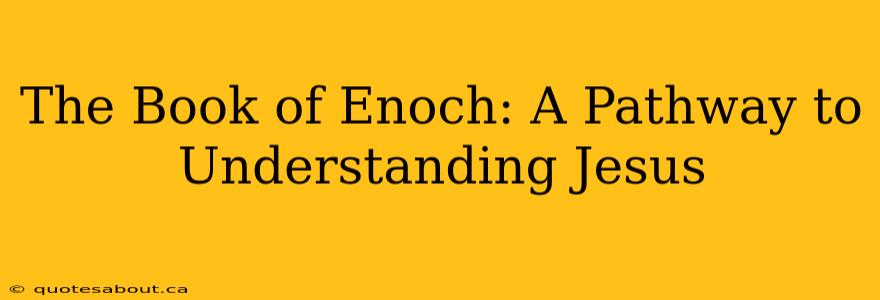The Book of Enoch, a collection of ancient apocalyptic texts, holds a fascinating, albeit complex, relationship with Christian theology. While not included in the biblical canon of most Christian denominations, its influence on early Christian thought and its potential parallels with the life and teachings of Jesus have captivated scholars and theologians for centuries. This exploration delves into the Book of Enoch, examining its key themes and considering its potential contribution to a deeper understanding of Jesus.
What is the Book of Enoch?
The Book of Enoch, attributed to the biblical Enoch, is not a single unified work but rather a compilation of different texts written over several centuries, likely between the 3rd century BCE and the 1st century CE. It's primarily known for its apocalyptic visions, descriptions of angelic hierarchies, and detailed accounts of the "Watchers," fallen angels who interbred with humans, leading to corruption and wickedness on Earth. These narratives often feature themes of divine judgment, the coming of a messianic figure, and the ultimate restoration of righteousness. The text presents a cosmology quite different from what we find in the canonical Bible, offering a rich tapestry of ideas concerning the nature of God, humanity, and the cosmos. Different sections of the book vary in style and content, reflecting the diverse periods and influences that shaped its composition.
Is the Book of Enoch Considered Canonical?
No, the Book of Enoch is not considered canonical by mainstream Christian denominations (Catholic, Protestant, Orthodox). Its exclusion from the Bible stems from various factors, including its relatively late appearance in the development of Jewish and Christian scriptures, its differing cosmological views compared to canonical texts, and concerns about its consistency with established theological doctrines. However, its influence on early Christian writings and certain New Testament themes is undeniable, a point that fuels ongoing debate among scholars.
How did the Book of Enoch influence early Christianity?
The Book of Enoch's influence on early Christianity is a subject of ongoing scholarly discussion. Its apocalyptic visions and descriptions of a coming judgment day resonated with early Christians grappling with persecution and the expectation of Christ's return. Certain themes, such as the idea of a heavenly council, angelic beings, and the concept of a future resurrection, find parallels in both the Book of Enoch and the New Testament. Some scholars argue that certain New Testament passages, especially in the Revelation of John, reflect the literary style and imagery present in the Book of Enoch. However, the extent and nature of this influence remain areas of active research and interpretation.
What are the Key Themes in the Book of Enoch Relevant to Jesus?
Several themes in the Book of Enoch resonate with aspects of Jesus's life and ministry:
- The Son of Man: The Book of Enoch features a prominent figure known as the "Son of Man," often depicted as a divine intermediary who judges the wicked and establishes a righteous kingdom. This figure shares similarities with Jesus' self-designation as the "Son of Man" in the Gospels, though interpretations of this title differ significantly. The Enochian "Son of Man" possesses pre-existence and divine power, characteristics that some scholars connect to the Christological understanding of Jesus.
- Judgment and the Coming of the Kingdom: Both the Book of Enoch and the Gospels emphasize themes of divine judgment and the establishment of God's kingdom. Enoch portrays a cataclysmic judgment, while the Gospels portray a more nuanced judgment, emphasizing love, mercy, and repentance. However, the shared emphasis on judgment and a future restoration of righteousness creates a point of connection.
- Angelic Warfare: The Book of Enoch's detailed descriptions of angelic warfare and the battle against evil forces have parallels with New Testament portrayals of spiritual conflict, suggesting a shared understanding of the forces at play in the spiritual realm.
Does the Book of Enoch Provide a Direct Pathway to Understanding Jesus?
While the Book of Enoch doesn't offer a direct, linear pathway to understanding Jesus, it provides a valuable context for exploring early Christian thought and its diverse theological influences. Analyzing its themes and imagery can enhance our understanding of the historical and intellectual landscape within which early Christianity emerged. It offers a glimpse into the apocalyptic and eschatological perspectives that shaped the beliefs and expectations of early Christians. The connections are not simplistic or direct; rather, the Book of Enoch presents a complex tapestry of ideas that invite further study and interpretation in relation to the life and teachings of Jesus. Caution is required, however, as directly equating Enoch's "Son of Man" with Jesus requires careful consideration of the differing contexts and theological frameworks.
What are other interpretations of the Book of Enoch?
Many scholars focus on the Book of Enoch's cultural and historical significance. It reflects the anxieties and beliefs of its time, revealing the socio-political realities and religious imagination of ancient Judaism. Understanding its literary context is crucial to interpreting its meaning accurately. Some scholars focus on interpreting the book within its own internal consistency, rather than attempting to directly map its themes onto canonical Christian theology.
The Book of Enoch remains a fascinating and complex text, offering a rich perspective on early Jewish apocalyptic thought and providing a valuable lens through which to examine the broader cultural and religious landscape that shaped the development of early Christianity. While not a direct guide to understanding Jesus, it undoubtedly contributes to a richer and more nuanced understanding of the historical and intellectual context of early Christian beliefs.

